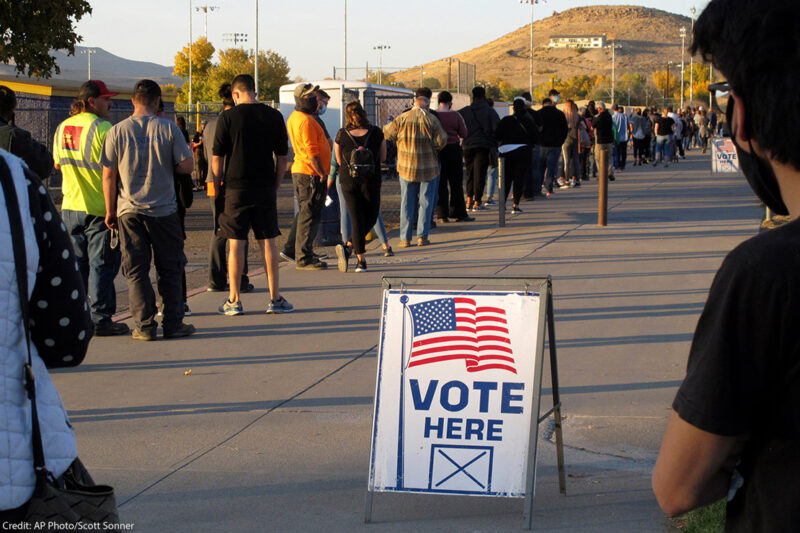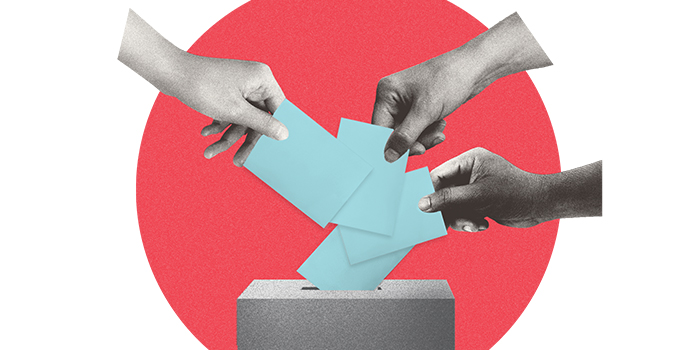Election Denialism Lost in Key Midterm Races, but the Fight is Far From Over


In the days and weeks after the 2020 presidential election, outright lies peddled on the national stage about the validity and security of state-administered elections proliferated. Politicians and political commentators spread and amplified falsehood after falsehood, baselessly alleging that the election was stolen through widespread fraud simply because their candidate of choice lost. Despite the fact that these allegations were proven false time and time again, and rejected by scores of state and federal courts, growing segments of the population became adherents to this “Big Lie.” This culminated in the devastating and unprecedented January 6 attacks on our Capitol that attempted to prevent a duly-elected president from assuming office.
One of the lasting threats galvanized by the “Big Lie” is election denialism — baselessly casting doubt on or refusing to accept the outcome of free, fair, and secure elections. In the face of ample evidence of the legitimacy of the 2020 election outcome, election deniers continue to try to undermine faith in our electoral process and democracy through baseless allegations of election fraud for personal and political gain. Alarmingly, many extreme election deniers secured candidacies for key state and federal positions that would give them direct control or influence over election administration and policy.
Americans Voted to Protect Democracy
It became clear as we approached the 2022 midterm elections that democracy itself — in addition to so many of our civil liberties — was at stake and on the ballot. Nearly 200 candidates on the ballot outright denied the 2020 presidential results through rhetoric or actions, and many more cast doubts on the 2020 election results. This included U.S. Senate candidates in Arizona and Nevada; U.S. House candidates in almost every state; gubernatorial candidates in Pennsylvania, Michigan, and Arizona; and secretary of state candidates in Arizona, Michigan, and Nevada, just to name a few.
Now, with most of the results of the midterm elections in, there is no doubt that the American people took firm stances against election denialism and voted to protect our democracy in the most vital races.
Election deniers that vied to be the next secretary of state — a position that involves directly overseeing state and local elections — lost their races in key battleground states, including in Arizona, Minnesota, and Nevada. The ACLU and our state affiliates made a substantial investment in educating voters about the vital role of secretaries of state and where candidates stood on protecting voting rights and democracy.
Two of the most fervent and vocal election deniers running for governor lost their races in Arizona and Pennsylvania. Pennsylvania is especially important because its governor appoints the secretary of state.
The Fights Ahead
Although this election season was an important step towards restoring democracy, the fight is far from over. While some of the most extreme election deniers failed in vital competitive races, many election deniers were elected, particularly to the U.S. House of Representatives and statehouses around the country. As we turn our focus toward the 2024 elections and beyond, Congress must enact bipartisan reforms to the Electoral Count Act before this Congress ends to ensure that electoral votes tallied by Congress accurately reflect each state’s popular vote for president. And we must continue to fight for federal voting rights legislation to address voter suppression efforts, fully restore the Voting Rights Act of 1965, and expand access to the ballot.

ACLU Comment on House Vote of the Electoral Count Act
Source: American Civil Liberties Union
Moreover, as state legislative sessions approach, we expect to see continued state-level efforts to interfere with free and fair elections and restrict access to the ballot box. We have seen this before: In 2021 alone, over 400 bills with voter suppression provisions were introduced in states around the country. These suppression efforts included restricting vote by mail, limiting early voting, making it more difficult to register to vote, implementing stricter voter ID requirements, enacting problematic voter purge rules, making it harder for voters with disabilities to cast a ballot, and threatening election officials and voters with new or increased criminal penalties.
Just this year, at least seven states enacted 10 laws to make voting more difficult by creating new hurdles to voting by mail (including limiting drop boxes and permanent absentee voting) and making it more difficult to register to vote (including through documentary proof of citizen requirements and limiting Election Day registration). Additionally, at least 12 laws that jeopardize the nonpartisan nature of elections or aim to intimidate election officials and voters with new civil or criminal penalties were enacted in 2022.
While we continue to fight back against attacks on voting rights and the integrity of our elections, we are doubling down on our proactive efforts to increase access to the ballot box and safeguard our democracy. In states such as New Mexico, we will build on progress made this session to push for comprehensive voting rights legislation that restores the voting rights of people convicted of felonies and makes it easier for Indigenous voters to exercise their right to vote.
In Connecticut, following the success of a ballot measure that removed a constitutional restriction on early in-person voting, the legislature has an opportunity to enact strong, accessible early in-person voting legislation. In Michigan, we will build on this midterm’s electoral successes by working to expand Election Day registration locations, automatic voter registration opportunities, and youth voting rights. We will also advocate for the adoption of the National Popular Vote Compact in states that have yet to enact it to move us closer to our ideal of one person, one vote in presidential elections, and we will advocate for the few remaining states that do not utilize voting machines with paper trails for all elections to do so.
Voting rights and protecting our democracy has always been a top priority for the ACLU. Our ACLU affiliates and our millions of supporters stand ready to continue this fight. We invite you to join us in upholding our democracy and ensuring that each and every voice — and vote — counts.
Donate to the ACLU
The ACLU has been at the center of nearly every major civil liberties battle in the U.S. for more than 100 years. This vital work depends on the support of ACLU members in all 50 states and beyond.
We need you with us to keep fighting — donate today.
Contributions to the ACLU are not tax deductible.


